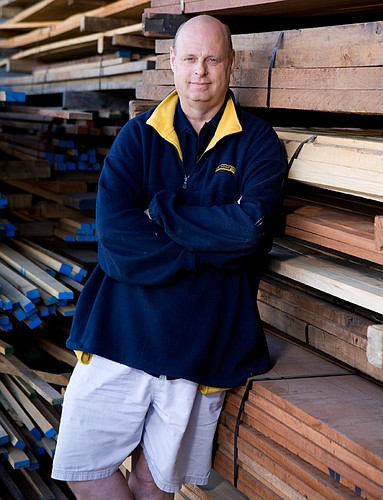- November 26, 2024
-
-
Loading

Loading

Oxford-educated executive Ray Fluitsma, 52, a tax attorney with degrees in economics and engineering, made a name for himself as a successful turnaround artist with 75 companies, many in Europe.
But his latest assignment, as chief executive officer of AMC Industries, a 35-year-old furniture making and wood, steel and glass millwork company in Temple Terrace, is not a turnaround situation, Fluitsma says.
It's a quest for growth and diversity beyond its 2,782 clients, which include Tampa-based Outback Steakhouse and Beef O' Brady's.
Fluitsma, a native of Holland who joined AMC as CEO in November, is off to a quick start.
He is closing a $10 million purchase of a complementary millwork company in Las Vegas, Magic Steel and Glass, and a kiosk-making company in Connecticut, which will increase AMC's production capacity.
Fluitsma has a new service contract with Sheraton to help remodel all of its U.S. hotels, including its Times Square location. He is buying out company founder Ray Walstead, a former carpenter who pioneered the company's initial work for Outback Steakhouse, who is retiring.
And perhaps most importantly, the Dutchman brings a lot of contacts in the financing, business and engineering world to AMC and its clients. And he plans to hire more people to work in AMC's 175,000-square-foot Temple Terrace millwork plant, although he can't estimate how many.
Walstead found Fluitsma while doing business with him. Fluitsma was trying to open restaurants and needed custom furniture and was working with AMC on building it. AMC later hired Fluitsma as its CEO.
Making more chairs
AMC makes booths, bars, cabinets, benches, fixtures and tables for restaurants. It also makes chairs. Because of their diverse uses, Fluitsma sees a bright future in chairmaking and wants AMC to step up its chair production because there is a market for good quality chairs at a reasonable price. Companies in China are not producing a high quality chair that will last for years, Fluitsma says.
About a mile from his millwook plant is AMC's 75,000-square-foot upholstery plant, which Fluitsma believes can do more work.
By controlling material costs and using a normal millwork margin, Fluitsma believes AMC can make better and cheaper chairs than its competition in China. He is talking to a company in Dubai that needs 22,000 chairs for hotels and theme parks.
AMC, which is privately held, would not release five-year revenue figures. But Fluitsma says the company, started in 1974, is profitable and should have revenues of more than $20 million this year. Revenues fell in 2008, a tough year for the restaurant and furniture businesses.
That's why AMC is pursuing non-restaurant work as well as restaurants. It is lining up work for hotels, theater stages and yacht makers, such as Benito.
Fluitsma is proud of the company's relatively quick turnaround work.
“You can draw a design on a napkin and in a week, we will have the products ready for you,” he says. “No one else can turn it around that way.”
Executive for hire
Fluitsma has retired three times, only to come back to work full time. His plan is to stay at AMC about seven to 10 years, grooming a successor along the way.
He knows of no direct competitors that do the variety of furniture and millwork that AMC does. The company does various kinds of wood, steel and glass custom work — basically everything except for windows.
How has AMC kept its profit intact despite increased materials costs? By reducing vendors. For its wood supplies, Fluitsma cut about 90% of AMC's vendors to focus on people the company can rely on, especially for quick turnaround jobs. He has tried to use local suppliers, such as Associated Hardwoods in Tampa.
AMC buys steel and glass from the same vendors. They are not the cheapest. But they are the most reliable the company can find.
“I want my vendors to be partners,” Fluitsma says.
One of the reasons why Fluitsma doesn't use the word turnaround is because he believes in the AMC staff, which includes skilled carpenters and machinists.
“It's not a turnaround,” he says. “It's a new direction. If you look at the huge talent we have, we can use what we have. We have extremely skilled carpenters. Machinists. It's all custom work.”
Despite the fall in revenue last year, Fluitsma doesn't see challenges at AMC, even with the recent struggles of the casual, sit-down restaurant industry. Part of the reason is that he is diversifying AMC. Another reason is that he has financial sources that are still writing loans for clients, and he shares those with his clients.
“Some banks are still lending,” he says. “Teacher unions are still writing loans. There's a lot of capital. When you are turning companies around, you meet a lot of people.”
Fluitsma is still on the lookout to buy other companies, for AMC and for his personal business interests. One of those is a hearing aid company.
One of the problems with U.S. manufacturers is an imbalance of too much labor or too heavy a reliance on machines, and not enough on having a trained staff. While machines can boost efficiency, many U.S. companies lack staff training. Fluitsma aims for a balance of good machines and a quality staff.
“That's why we're successful,” he says.